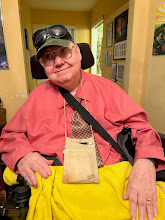Tuesday, September 25, 2012
Three tricks to improve your writing
There are three great tips for improving writing: simple sentences, simple language, simple logic.
Simple sentences are best. People with dyslexia often have difficulty with writing. Dyslexics can think about ideas but have difficulty getting the ideas written down. Frequently thoughts are not written down as complete sentences. On the other hand, one very long sentence can end up being a paragraph. Writing can be improved by understanding sentences. Sentences are made up of a subject and predicate. Here are two sentences.
1. John spoke eloquently to his mother.
The subject is "John". The predicate is "spoke eloquently to his mother."
2. Abraham Lincoln was president during the American Civil War.
The subject is "Abraham Lincoln". The predicate is "was president during the American Civil War."
Simple sentences are clear. Simple sentences get ideas across. Sentences with combined ideas are confusing. So simple is best.
Simple language is best. People generally learn to write in school. Writing often imitates the things that are read. Dyslexics often do not read a lot. Dyslexics often mostly read textbooks. Surprisingly, textbooks are often not good examples of writing. Textbooks are ponderous to read. Textbooks are filled with specialized language and jargon. Good writing sounds like a conversation. Good writing sounds like talking to a friend.
Simple logic is best. Conversations are best when ideas flow from one another. Writing is the same way. Here is a method for making writing flow logically. You start by writing a list of your ideas. Each idea is expressed by just one word or maybe three words. You then rearrange your word list so ideas flow from one to another. Writing usually has a beginning, a middle and an end section. So you rearrange your list into a beginning, middle and an end. At first writing has gaps in the logical steps. You look over your list and add additional ideas. You then arrange your ideas into similar groups to make paragraphs. Last you write a simple sentence for each of your ideas. Before you know it, you have written your paper, story or poem.
Simple sentences are best. People with dyslexia often have difficulty with writing. Dyslexics can think about ideas but have difficulty getting the ideas written down. Frequently thoughts are not written down as complete sentences. On the other hand, one very long sentence can end up being a paragraph. Writing can be improved by understanding sentences. Sentences are made up of a subject and predicate. Here are two sentences.
1. John spoke eloquently to his mother.
The subject is "John". The predicate is "spoke eloquently to his mother."
2. Abraham Lincoln was president during the American Civil War.
The subject is "Abraham Lincoln". The predicate is "was president during the American Civil War."
Simple sentences are clear. Simple sentences get ideas across. Sentences with combined ideas are confusing. So simple is best.
Simple language is best. People generally learn to write in school. Writing often imitates the things that are read. Dyslexics often do not read a lot. Dyslexics often mostly read textbooks. Surprisingly, textbooks are often not good examples of writing. Textbooks are ponderous to read. Textbooks are filled with specialized language and jargon. Good writing sounds like a conversation. Good writing sounds like talking to a friend.
Simple logic is best. Conversations are best when ideas flow from one another. Writing is the same way. Here is a method for making writing flow logically. You start by writing a list of your ideas. Each idea is expressed by just one word or maybe three words. You then rearrange your word list so ideas flow from one to another. Writing usually has a beginning, a middle and an end section. So you rearrange your list into a beginning, middle and an end. At first writing has gaps in the logical steps. You look over your list and add additional ideas. You then arrange your ideas into similar groups to make paragraphs. Last you write a simple sentence for each of your ideas. Before you know it, you have written your paper, story or poem.
Subscribe to Comments [Atom]
